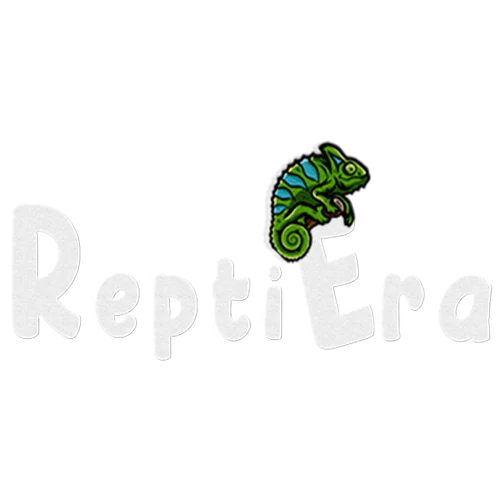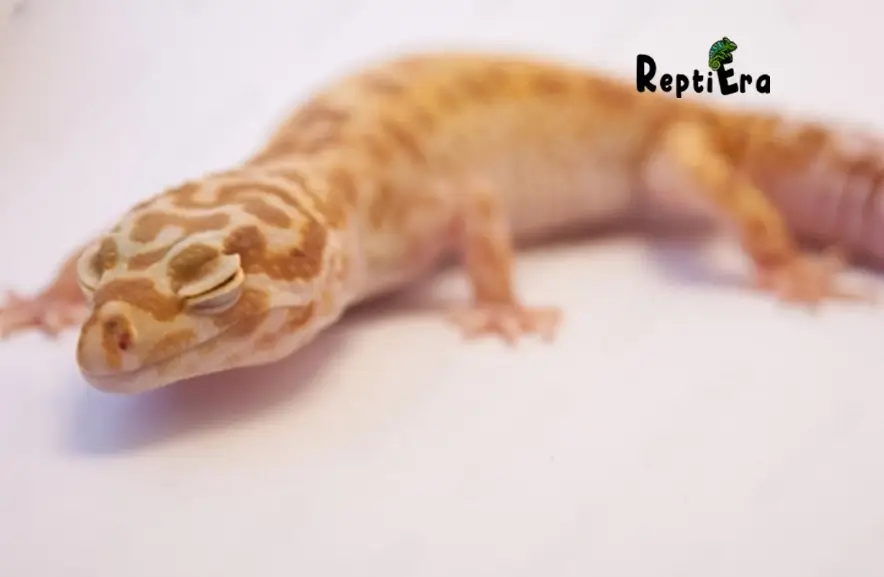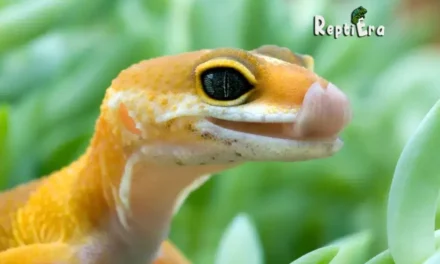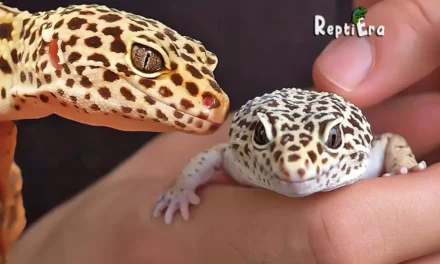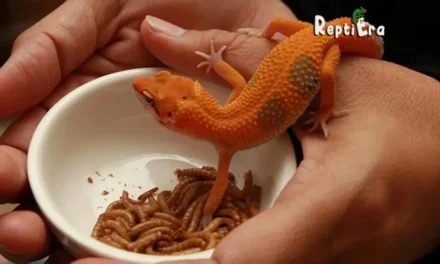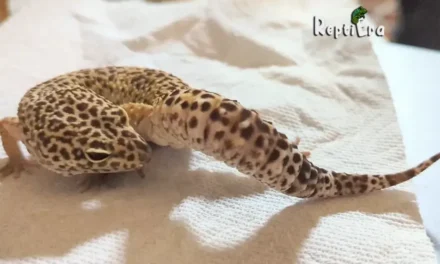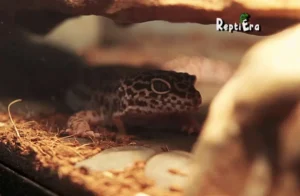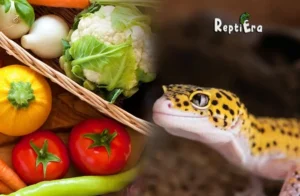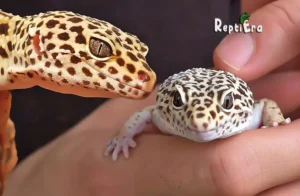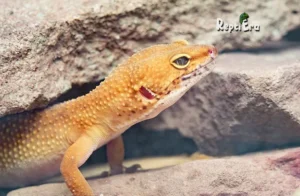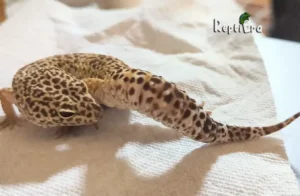When you observe a leopard gecko with its eyes closed, it might seem like it’s sitting meditatively. My gecko, Leo, often does this, and it’s a sign of being in the right mind. This behaviour can resolve many queries about these fascinating creatures. Often, owners notice their geckos with their eyes closed and worry they might be irritated.
Why Leopard Gecko Closing His Eyes?
This irritation can stem from exposure to irritants like bright light, dust, peat moss, or sand particles. Sometimes, a scale might get stuck on their eyelids during shedding, which is a natural coping mechanism. Intriguingly, geckos often open one eye while sleeping to check their surroundings. If your gecko’s eyes remain closed for over a day, it’s wise to seek a vet inspection for professional advice on the underlying reasons.
Table of Contents
Why Leopard Gecko Closing His Eyes
Reason #1 – Substrate or Debris
Leopard Geckos are habitual creatures, spending time on the ground, which is their naturally ground-dwelling nature. It’s not uncommon for things to get stuck in their eyes, like dust or grain particles from their mulch substance habitat. These tiny bits of grit can irritate, leading to watery eyes. In response, a gecko might shut its eyes to naturally lubricate and rid itself of foreign material. This behaviour is a self-preserving mechanism, ensuring their delicate eyes are protected from the rough elements of their enclosure.
Reason #2 – Eye Trauma
Eye trauma and eye injuries can occur while a gecko is playing, leading to a bruise or scratch. You might notice them squint if they hurt themselves in their tank. As someone who keeps their gecko entertained, it’s understood that an occasional eye injury is unavoidable. It’s crucial to assess the situation like a pro parent and figure out if they need to be taken to the vet. If the injury is mild, it may heal on its own, but if your gecko keeps its eyes shut for more than a few days, it should be inspected by a professional.
Also Read: WHY DO LEOPARD GECKOS CHIRP
Reason #3 – Stuck Scale
A gecko’s eyelids are quite distinct, unlike those of other lizard species. When a gecko sheds its skin, sometimes a scale can get stuck around the eyelids, a common issue during shedding. To help, increase the humidity in their tank, ensuring moisture keeps their skin well-lubricated. If a scale remains, a warm water compress can be gently dabbed on the eyes. This allows the gecko to move and rid itself of any foreign particles or lingering skin fragments, helping to clear its eyes.
This Video guides you on how to Clean Gecko’s eye when Scale And Dirt Stuck in their eye.
Reason #4 – Bright Light
A common cause for a gecko closing its eyes is over-exposure to bright lights. Leopard Geckos are nocturnal creatures, inherently light-sensitive, and can see up to 350 times better than humans in the dark. They often shut their eyes if the light is too much, as they cannot constrict their pupils sufficiently. This disturbs their circadian rhythm. To prevent this, opt for heating setups that barely emit light, ensuring the heating does not distress your gecko.
Reason #5 – Eye Infections
Leopard geckos often experience viral, fungal, or bacterial infections in the eye, which can penetrate the cornea or pupil and result in inflammation, shrinkage, and symptoms like red, watery, and swollen eyes. This irritation leads them to shut their eyes. In the case of an eye infection, it’s not uncommon to see simultaneous developments of these symptoms. Prescribed antifungal and antibacterial treatments can help them heal faster. If untreated, these infections can cause significant damage to their delicate eyes.
Also Read: DO LEOPARD GECKOS NEED SUBSTRATE
Reason #6 – Abscess
An Abscess, often seen as a bump under the eye of a gecko, can be a source of irritation. It usually arises from trauma, injury, or an eye infection and can result in abscesses if untreated. This discomfort leads to the gecko shutting its eyes more frequently. In such cases, it’s essential to seek vet care to address the underlying cause and provide relief.
Reason #7 – Dry Eyes
Leopard geckos naturally secrete fluid to keep their eyes hydrated and clear of debris. However, a lack of water or low humidity in their tank can cause their eyes to dry out, leading to sticking together due to mucus buildup. This is not only a sign of illness but can also clog their ability to produce these essential fluids. Providing a moist hide in their habitat can greatly help in maintaining their eye health.
Reason #8 – Vitamin A Deficiency
Hypovitaminosis A, or vitamin A deficiency, is a significant factor in various eye conditions in leopard geckos. Its symptoms are often similar to conjunctivitis, making diagnosis challenging without a biopsy of the affected tissue. Vets typically treat both conditions simultaneously. One effective preventive measure is feeding feeder insects like crickets with vitamin A-rich food, greatly aiding in preventing and correcting such vitamin deficiencies. This approach is highly recommended for maintaining the eye health of leopard geckos.
Also Read: CAN LEOPARD GECKOS EAT VEGGIES
Reason #9 – Parasites
In leopard geckos, especially those in captivity, eye parasites are relatively rare due to their isolation from larger populations where such issues are more common. However, occasionally, worm parasites can be a concern, sometimes observed swimming in the eyeball—a sight that certainly warrants a “yuck” (and you have my permission to say so). This unusual and somewhat disturbing condition can lead to eye closure in these sensitive reptiles.
Reason #10 – Congenital Issues
Eye-closing issues in leopard geckos can sometimes be congenital, stemming from abnormalities caused by faulty genes. These issues often become apparent early in the pet’s development. In extreme cases, conditions like anophthalmos, where an eye hasn’t properly formed, or Ankyloblepharon, characterized by fused eyelids, are observed. Such congenital defects might require a surgical procedure to correct, impacting the gecko’s ability to open and close their eyes normally.
Reason #11 – Neoplasia
Neoplasia, an abnormal lesion or growth caused by uncontrolled cell proliferation, can be a reason behind a leopard gecko’s eye closure. These growths, which can be either cancerous or benign, often need to be identified through a biopsy, especially when unusual lumps are noticed. While not always immediately evident, these lumps can sometimes be mistaken for abscesses. In geckos, neoplasia can impact eye function, leading to their eyes being shut more frequently.
Why Your Leopard Gecko Closes One Eye
When your leopard gecko starts closing one eye for extended periods, it’s not just a case of winking. Such behaviour raises concerns, especially if it persists for prolonged periods. As a pet owner, you might get worried, but it’s crucial to identify the underlying issue to help your little lizard buddy. The eye is a fragile area of the body, so it’s important to be careful with your pet and seek appropriate care if this behaviour continues.
Why Your Leopard Gecko is Sleeping With One Eye Open
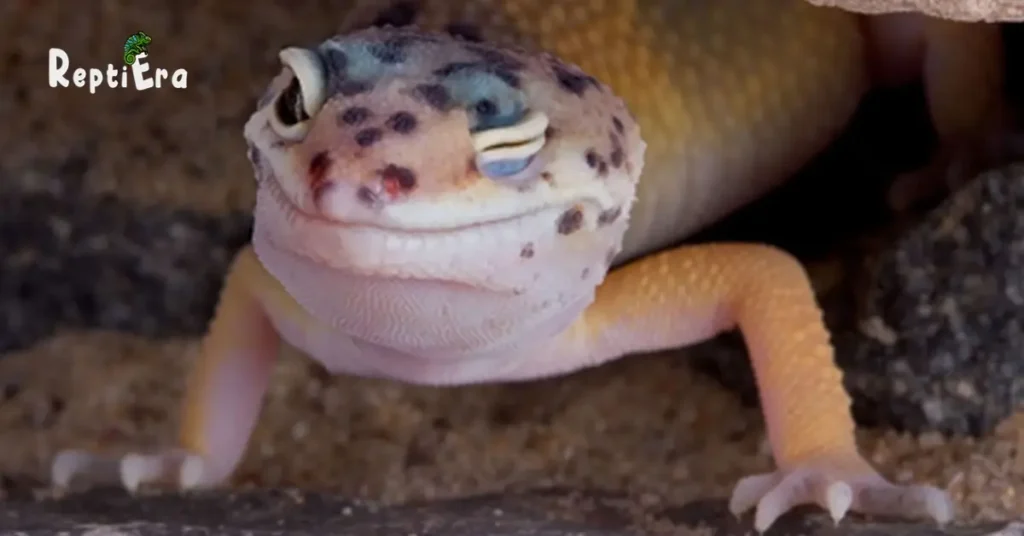
A gecko is a smart creature, often sleeping while staying alert to its environment. If it hears an unusual noise or senses a disturbance, it may open an eye in a long stare. You might catch your gecko sleeping, and then it suddenly opens an eye, which might creep out some owners. This behaviour is their way of keeping an eye on their surroundings, helping them guard themselves in an easy and convenient manner.
How to Prevent Eye Problems in Leopard Geckos
Keeping your gecko’s eyes healthy involves several measures. Firstly, regularly clean the tank to keep it free from unwanted and pointed particles that are harmful. Use grit-free rocks or smooth, round objects for decoration. During playtime, be cautious to avoid hurting their eyes.
A vitamin A-rich diet contributes to a healthier gecko and helps prevent eye injuries. Incorporate a quality reptile supplement to meet their nutrition needs. Choose soft substrates like sterile soil, avoiding anything hard that could damage their eyes. Regarding lights in the tank, ensure they are not too bright to avoid overexposure, which irritates their eyes and disrupts their sleep schedules.
Also Read: HOW FAST IS A LEOPARD GECKO
FAQs
Did you know that most geckos don’t have eyelids?
Gecko species like crested geckos, day geckos, and house geckos can’t close their eyes; they rely on a nictitating membrane, a thin, transparent skin covering the eye, to keep it moist and debris-free.
Can house geckos close their eyes?
Unlike most lizards with eyelids that can close their eyes for sleep, geckos, belonging to the infraorder Gekkota, are a unique group; their species, including leopard geckos and their relatives, lack this feature.
Why do leopard geckos lick their eyes?
Leopard geckos, unlike other lizards, cannot move their eyelids; instead, they lick their eyes to moisten them, compensating for their lack of eyelid movement.
Why are my gecko’s eyes swollen-shut?
Swollen-shut eyes in a gecko can be a sign of vitamin A deficiency, known as Hypovitaminosis A; to prevent this, ensure a vitamin-dense diet and consider supplements if necessary.
What are some common eye diseases in leopard geckos?
Leopard geckos commonly face eye infections like conjunctivitis, abscesses, corneal ulcers, and blepharospasm, often accompanied by symptoms like ocular discharge and sometimes parasite infections.
Conclusion
When your Leo starts closing their eyes, it might drive you nuts, but there’s a plethora of reasons for this behaviour. Often, foreign particles or debris in their environment cause discomfort, leading to eye closure. Excessive light is another common cause of this happening. Generally, it’s a non-serious action, but if your gecko starts behaving differently over several days, keeping its eyes shut during the day, it might signal something more concerning. Eye infection or injury should be considered, especially if your pet’s eyes appear swollen or red. In such cases, don’t hesitate to seek immediate vet care, as these conditions can potentially damage the eye if left untreated.
